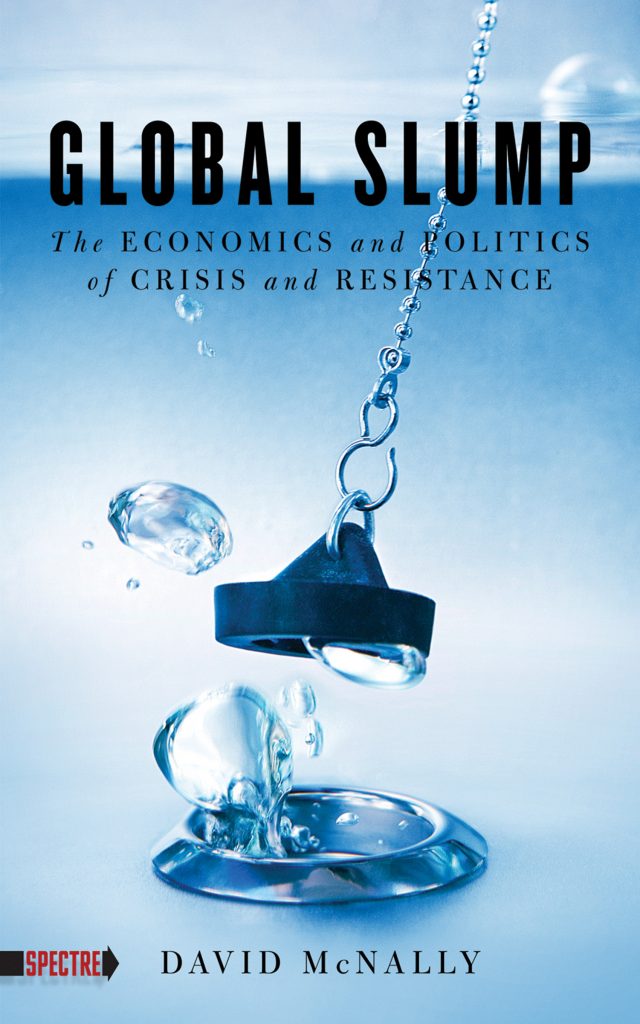by Richard Seymour
Wednesday, January 05, 2011
In the neoliberal phase of accumulation, capitalism underwent several dynamic changes. Its operations were downsized, re-organized and technologically upgraded. This is how David McNally puts it, in his highly recommended new book, Global Slump: “It is not simply that jobs went to the South, though in some industries this clearly happened. It is more that a severe process of restructuring occurred that involved an enormous downsizing of workforces and “leaning” of production systems everywhere. Geographic reorganizations, sometimes within the bounds of a nation-state, as in the flight of plants from the northern to southern United States, were one part of this picture. While industry-specific changes may have been in play in the case of steel, we observe a common pattern combining new technologies with old-fashioned employer tactics of speed up, contracting out, and undermining of unions.
Production was made more “flexible” largely by making labor so—by tiering wages, altering shifts, increasing insecurity and precarious employment (casual, part-time, and contract work), and enhancing employers’ power to hire, fire, and reorganize work. New technologies thus combined with old forms of precariousness to boost labor productivity.” (pp. 47-8)
This reorganisation of capitalism – made possibly by raw class power and imperialist aggression toward the global South – had been conceived in its essential outlines within the laboratories of the social sciences departments of universities, a long-standing redoubt of ruling class project design. The ‘Chicago Boys’ just happen to be the most easily recognisable brand name of this particular firm and its maitres penseurs. The pretext was that centralised planning, corporatism, collective bargaining the hierarchies of the Keynesian era, had failed. The solution was capitalist freedom, of the kind extolled by Friedrich Hayek.
Hayek’s approach to ‘freedom’ placed great stress on information. The case for markets and competition, and against socialism and planning, was based on the problem of how producers would come by the relevant knowledge to behave in an efficient manner. This knowledge could not be accumulated and concentrated in the hands of planners, but was distributed in fragments, bits of incomplete and contradictory knowledge among a multitude of actors. Knowledge and learning are necessarily constrained by one’s position relative to one’s peers, so that one is dependent on the pathways linking one to those peers – those being price signals. The economy thus works as an informational flow, a network which – if allowed to operate without the distortions of monopoly and intervention – is greater than the sum of its nodes. If each node comprises a partial, insignificant piece of knowledge (your shopping list, your debts, the change in your wallet, your evolving gustatory propensities, etc.), the whole network aggregates that knowledge in a way that enables the needs of each to be met satisfactorily. This approach embraces what many have taken to be the rudiments of modern network theory.
A somewhat different, overlapping critique of the old hierarchies also had its impact on the self-understanding of capitalist enterprises, or so argue Luc Boltanski and Eve Chiapello in their monumental book on The New Spirit of Capitalism. The ‘spirit’ of the title, borrowed from Weber, refers to an ideology that justifies people’s commitment to capitalism. This commitment is necessary to the reproduction of capitalist relations, and it must be exacted from many many more people than can expect to significantly benefit from the process. These firms, having adopted lean production and flexibility, sought through the 1970s to incorporate elements of the Sixties critique of capitalism, of counterculture, and re-organise their systems along networked lines, embracing some of the ideas of self-management: “autonomy, spontaneity, rhizomorphous capacity, multitasking (in contrast to the narrow specialisation of the old division of labour), conviviality, openness to others and novelty, sensitivity to differences, listening to lived experience and receptiveness to a whole range of experiences, being attracted to informality and the search for interpersonal contacts”. (p. 97) This is not, of course, to say that corporations ceased to be hierarchies, that managers ceased to control, or that spontaneity and creativity ceased to be stifled. This is an ideology, at the centre of which is a hard kernel of reality, that being lean production, flexi-working, spatial re-organisation and technological upgrading.
In the field of academic production, things were not much different. Employees of universities undergoing proletarianisation were also encouraged to think entrepreneurially, embrace transdisciplinarity, and so on. (Students are now also being encouraged to think entrepreneurially, as a demonstration of ‘corporate skills’ will give them higher marks.) But these employees were not always or necessarily unwilling in their task, and the intellectual reaction that accompanied this global capitalist reformation, which was inaugurated by a particularly grotesque revival of McCarthyism on the Left Bank, tended to evince the same suspicion of planning, of centralisation, and particularly of totalitizations such as nations, classes and societies, as the Hayekians. There was only the fragmentary and the contingent. Mrs Thatcher’s jibes against the idea of class and society were met with differing degrees of mortified outrage at the time. But in the academia – including the humanities departments that the Thatcherites tended to disapprove of – the idea that such metanarratives were inherently absurd and oppressive was gaining currency.
In practise, what tended to happen was that the metanarratives based on class, agency, power, social determinants, and so on, tended to be replaced by metanarratives based on informational flows, networks, autonomous processes, choice and flexibility. Sometimes this went under the heraldry of ‘postmodernism’, but not always. The emergence of ‘globalisation’ as the master-concept of the 1990s was accompanied by a blizzard of academic work on informationalism, the knowledge economy and so on. Signs and symbols, more than matter, were the determinants of life on earth. It’s relevant to stress how widespread this anti-materialist turn was, and in how many fields. If in the field of economics, materialist value theory was replaced by a (circular, mundane) subjective value-theory, in the field of history, materialist accounts of class, labour, sex and oppression entered a recession, making way for the ‘cultural turn’, while in sociology, the courtiers of the Third Way such as Anthony Giddens and Charles Leadbeater vaunted the ‘knowledge economy’ and the ‘weightless society’. As capitalism started to make its returns increasingly on inflated values in the stock market, its most vulgar apologists held that this bubble was nothing other than a “most of us make our money from thin air”, producing nothing that can be touched, weighed or easily measured. Globalization itself was conceived of as an autonomous, self-expanding process, almost as a Weltgeist against which humanity was powerless.
So, by this point, you’ll be wanting me to explain what all this has to do with the new social movements, with the multitudes, with swarms, with networks and their technophilic informationalist paradigms? What bearing could it have on the strange, hubristic notion of decentralised, networked, non-hierarchical, autonomously self-sustaining social movements? Well, I’ll have to deal with that in another post.







